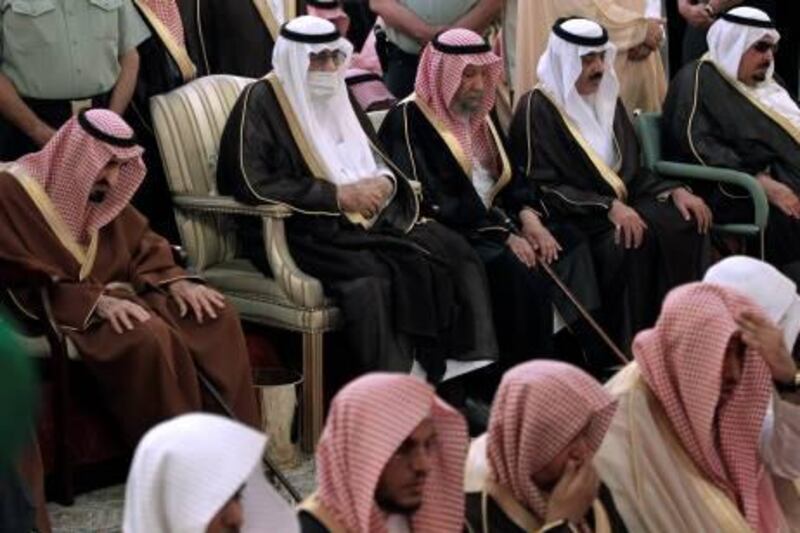RIYADH // In a simple but sombre ceremony, the body of Crown Prince Sultan Bin Abdulaziz Al Saud of Saudi Arabia was buried in an unmarked grave yesterday alongside those of fellow members of the ruling family in a public cemetery in Riyadh.
The burial came after prayers at the Imam Turki bin Abdullah mosque, where the Custodian of the Two Holy Mosques, King Abdullah bin Abdulaziz, received royalty and political leaders from around the world.
The body of Crown Prince Sultan was covered in brown fabric as he was carried to the front of the mosque, where it was placed on the ground in front of Sheikh Abdulaziz Al Sheikh, the Grand Mufti of Saudi Arabia. Flags across the region flew at half-staff, except in Saudi Arabia, which does not lower its flag.
In mosques throughout the kingdom, including those in Mecca and Medina, prayers were also held for the man known as Sultan Al Khair, or the Sultan of Good, whose successor as crown prince has not yet been named.
From the UAE, Sheikh Mohammed bin Rashid, Vice President of the UAE and Ruler of Dubai, and Sheikh Mohammed bin Zayed, Crown Prince of Abu Dhabi and Deputy Supreme Commander of the UAE Armed Forces, were among the dignitaries who flew into Riyadh from all over the world for the funeral.
"Today, we are all mourning a man who influenced us all to be the best that we can and that best comes through service to Allah and to others," said Mohammed Al Otaibi, a captain with the Saudi navy who met Prince Sultan 15 years ago when he graduated from the naval academy.
"Sultan was always happiest when meeting regular Saudi citizens, listening to their problems and helping to solve them. He enjoyed giving more than he enjoyed receiving."
Majed Al Sharif, a 32-year-old bank manager, spoke of how touched he was when he saw mobile phone footage of Prince Sultan visiting disabled orphans.
"Prince Sultan walked into an orphanage for special-needs children and picked up one of the children out of a wheelchair," Mr Al Sharif said. "The boy hugged Price Sultan and told him, 'I love you'.
"A staff member at the orphanage asked the little boy if he knew who he was kissing and the little boy said he didn't. That made Prince Sultan laugh. Then he told the boy he loved him too. The prince asked the boy what he wanted and the boy said he wanted prayer beads.
"Prince Sultan gave him more than that. But what I found touching was the exchange between them - it was like an exchange between a grandfather and a grandson."
Prince Sultan, 85, was the half-brother of King Abdullah, who is two years older. The most likely candidate now to replace Prince Sultan as King Abdullah's designated successor is Prince Naif bin Abdulaziz, 77, also a half-brother who as interior minister is in charge of internal security forces.
After Prince Sultan became ill in 2009, King Abdullah appointed Prince Naif second deputy prime minister, traditionally the post of the second in line to the throne.
King Abdullah is now expected to call to session the Allegiance Council to appoint the new crown prince. The Allegiance Council was set up in 2006 soon after King Abdullah became monarch, and is charged with voting to approve the king's choice of crown prince or nominating its own choice instead.
Prince Sultan's death prompted all Saudi state television channels to cancel regular programming and go live to shots from the mosque in Mecca.
Barack Obama, the US president, called the prince a "valued friend" who had helped to cement ties between the allies.
Prince Sultan died in New York on Saturday and his body arrived in Riyadh on Monday night, where it was met by the highest ranking members of the Saudi royal family, religious leaders, dignitaries, leaders of the armed forces and the public.
Prince Sultan, who was the kingdom's deputy prime minister and minister of defence and aviation, had suffered from what was widely believed to be cancer for several years. He underwent surgery in New York in February 2009 for an undisclosed illness and spent almost a year abroad, recuperating in the United States and at a palace in Agadir, Morocco.
His simple grave lies by those of other members of the royal family, including King Fahd, King Khaled and King Faisal, carefully positioned three metres from a road skirting the edge of the cemetery so passers-by can pause for a moment to pray for his soul.





